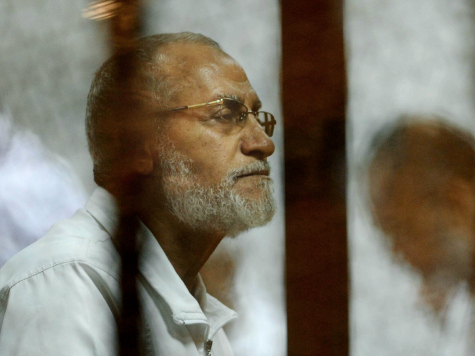The Egyptian government has been cracking down on the Muslim Brotherhood and its supporters, going so far as to confirm a sentence of death for the leader of the Muslim Brotherhood and 182 supporters, while the United States is finally releasing $575 million in military aid to Egypt after freezing the funds when Muslim Brotherhood member and Egyptian President Mohammed Morsi was ousted last year.
On Saturday, an Egyptian court confirmed the death sentences of Mohamed Badie, the general guide of the Brotherhood, and other defendants, who were charged after violence in the southern town of Minya killed a police officer last year after Morsi was ousted. Badie was previously jailed by President Gamal Abdel Nasser nearly 50 years ago with the Muslim Brotherhood then-leader, Sayyid Qutb, who was executed in 1966. Qutb’s writings in jail are thought to have inspired multiple Islamist militants including Ayman al-Zawahri, the successor to Osama bin Laden as leader of al Qaeda.
Morsi’s Islamist supporters have been targeted by the new government since Morsi’s ouster; many have been killed in violent clashes with the new government. At least five hundred army and police officers have been killed according to Reuters.
The new Egyptian president, Abdel Fattah al-Sisi, was elected in May and stated before the vote was taken that the Muslim Brotherhood was finished and he would not tolerate its existence. After the verdicts were announced Saturday, roughly 200 people who were relatives of defendants who were freed chanted outside the courthouse, “Long live justice, long live Sisi.”
Of the total 683 defendants, 496 were acquitted, roughly 100 are in detention, and the rest were tried in absentia. All of the verdicts have the possibility of appeal.
Morsi’s reign was brutal toward its opponents; Egypt’s El Nadeem Center for Rehabilitation of victims of violence said there were 359 torture cases during Morsi’s one year in office.
Meanwhile, Secretary of State John Kerry met with al-Sisi and pressed the Egyptian leader to protect the rights of all Egyptians. The U.S. aid was released about a week and a half ago after Congress approved it. The funds are chiefly targeted for existing defense contracts. Kerry, noting ten Apache attack helicopters provided for Egypt to use against terrorists in the Sinai peninsula, promised, “The Apaches will come, and they will come very, very soon.”
Kerry warned, “For Egypt, this is a moment of high stakes and also a big opportunity,” and added that promises made by the government “are yet to be fulfilled. After three difficult years of transition, the United States remains deeply committed to seeing Egypt succeed.” He also said that Washington would “stand with the Egyptian people in their fight for the future they want.”
Before Kerry’s statement, al-Sisi met Saudi Arabia’s King Abdullah in Cairo; Saudi Arabia also has named the Muslim Brotherhood a terrorist organization.
On Saturday, secular protesters battled with police near a presidential palace in Cairo. Last November, Egypt banned protests without police permission.
The new Egyptian government has been accused of going too far in its relentless pursuit of the Muslim Brotherhood; on Monday an Egyptian court convicted three journalists who work for Al-Jazeera English and sentenced them to seven years in prison on terrorism-related charges. Australian Peter Greste, Canadian-Egyptian Mohammed Fahmy, and Egyptian Baher Mohammed were arrested last December and charged with supporting the Brotherhood and creating false footage to propagate the notion that the country was about to have a civil war.
Fahmy, who was Al-Jazeera English’s acting Cairo bureau chief, screamed, “I swear they will pay for this,” while Greste waved his fists in the air.
Australian Foreign Minister Julia Bishop said, “We are all shocked by this verdict. The Australian government urges the new government of Egypt to reflect what message is being sent to the world. We are deeply concerned that this verdict is part of a broader attempt to muzzle media freedoms.”
Yet among the other 17 co-defendants in the case, two were acquitted, including the son of Mohammed el-Beltagy, a high-level official in the Muslim Brotherhood.
Australian Prime Minister Tony Abbott said Monday he had contacted al-Sisi over the weekend to protest Greste’s innocence, saying, “I did make the point that as an Australian journalist, Peter Greste would not have been supporting the Muslim Brotherhood, he would have simply been reporting on the Muslim Brotherhood. The point I made was that in the long run, a free and vigorous media are good for democracy, good for security, [and] good for stability.”
Canadian ambassador David Drake said, “We are very disappointed. We are digesting this… We have to put our faith in the judicial system. We don’t understand this particular verdict.” British ambassador James Watt echoed, “Freedom of expression is fundamental to any democracy.”

COMMENTS
Please let us know if you're having issues with commenting.